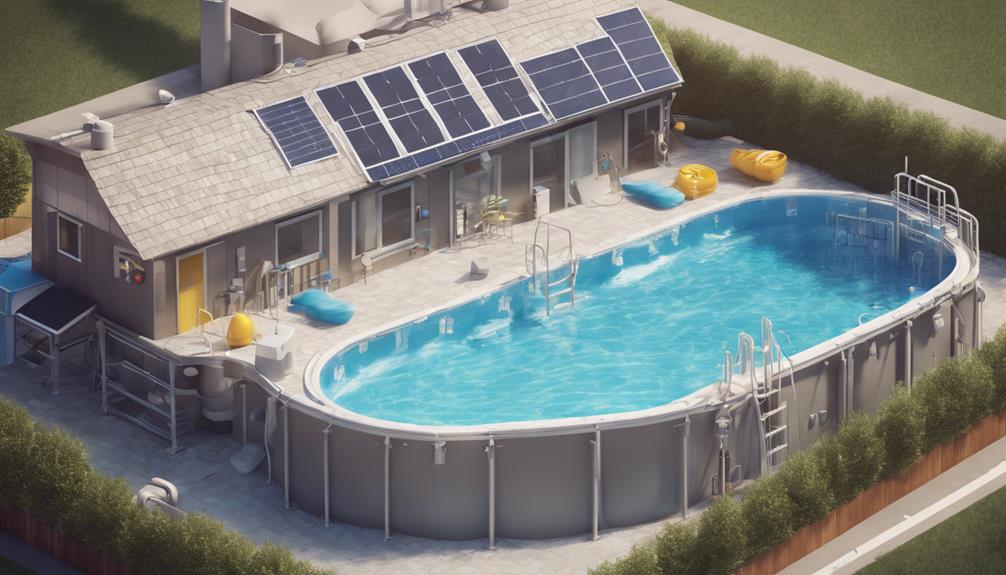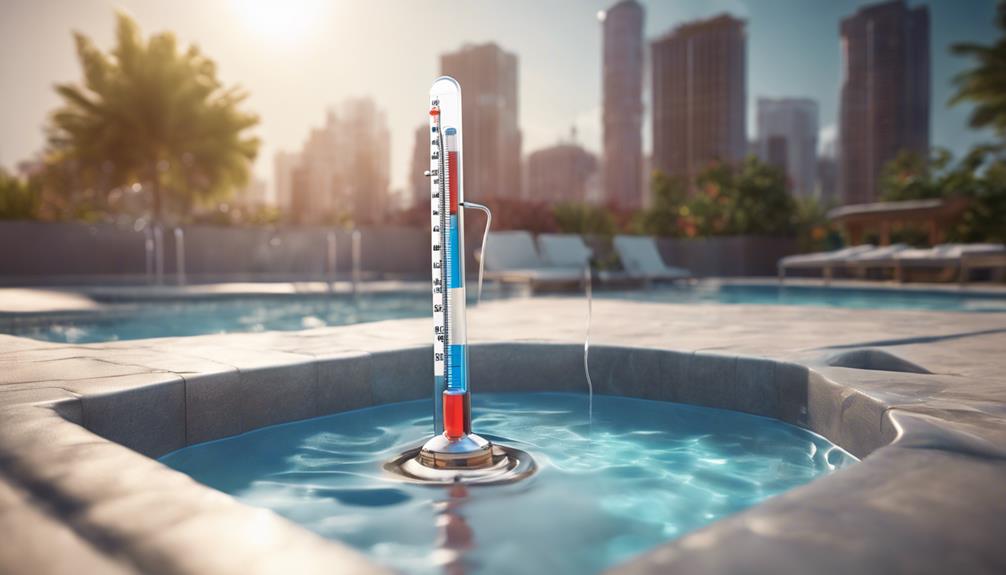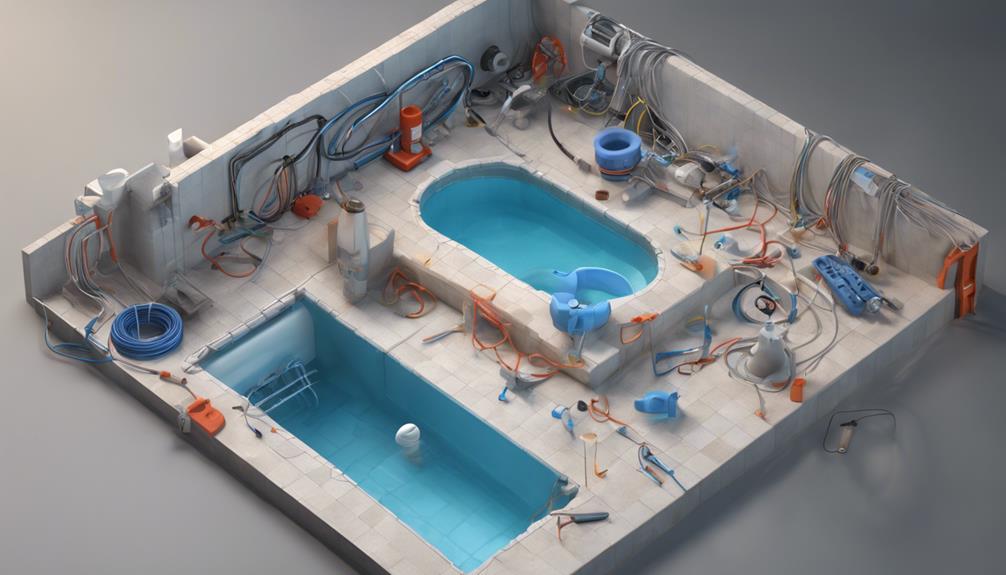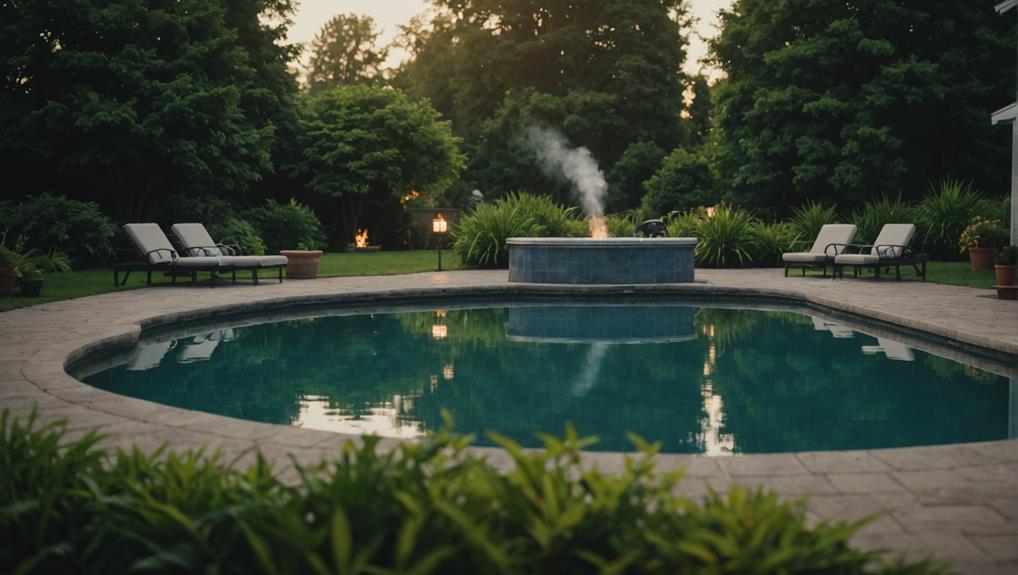You're facing a sticker shock with the cost of installing a pool heating system, ranging from $1,500 to $7,000, because the type and size of the heater, complexity of the installation, and labor costs all converge to drive up the price. The type of heater you choose substantially affects the cost, with solar heaters being more expensive upfront. Larger pools require more powerful heaters, adding to the cost. Labor costs, which range from $500 to $2,000, are also influenced by the pool size and type. As you navigate the complexities of pool heating system installations, you'll uncover more factors that impact the final cost.
Key Takeaways
- Pool heater type and size significantly impact installation costs, with solar and larger heaters being more expensive.
- Labor costs, influenced by pool size, type, and complexity, can range from $500 to $2,000.
- Installation complexity, location, and travel time also contribute to higher labor costs.
- Additional expenses, such as removing an existing heater or installing new wiring and plumbing, add to the total cost.
- Upfront costs of high-efficiency heaters or custom systems may be higher, but can lead to long-term savings.
Average Pool Heater Installation Cost
You can expect to pay between $1,500 and $7,000 for a typical pool heater installation, depending on the type and size of the heater, as well as the complexity of the installation process.
The cost of installing a pool heater varies widely, and vital to understand the factors that influence the final bill.
The type of pool heater you choose plays a significant role in the overall cost. For instance, a gas pool heater will generally be more expensive than a heat pump or electric heater.
The size of the heater is also a vital factor, as larger heaters require more materials and labor to install.
Labor costs to install a pool heater can range from $500 to $2,000, depending on the complexity of the job.
On average, you can expect to pay around $3,000 to $5,000 for a standard pool heater installation.
When you're installing a pool heater, pivotal to weigh the average cost of the installation, as well as the ongoing pool heater costs, so you can make an informed decision and verify you're making a sensible choice.
Factors Affecting Installation Costs
Several key factors, including the type of pool heater, pool size, and climate, substantially influence the overall installation cost, leading to a wide range of prices.
You'll find that the type of heater you choose markedly affects the cost of the installation. For instance, solar pool heaters tend to have a higher upfront cost, ranging from $2,000 to $7,500, while gas or propane pool heaters cost between $1,500 to $6,000. Electric resistance heaters are the most affordable option, costing between $500 to $5,000.
The size of your pool also plays a notable role, as larger pools require more powerful heaters to maintain the desired temperature. Labor costs, which range from $500 to $1,000, are also influenced by the pool size and type, with inground pool heaters typically requiring more labor and materials.
Additionally, colder climates may require heat pumps or more powerful heaters, increasing the overall cost. Understanding these factors will help you better estimate your pool heater installation costs and make informed decisions.
Cost by Type and Size

As you consider the various factors affecting installation costs, it's clear that the type and size of your pool heater are key determinants of the final price tag.
The type of pool heater you choose substantially impacts the cost, with different types offering varying levels of efficiency and performance.
Solar pool heaters: $2,000 to $7,000, with an average cost to run of $0 per year
Electric resistance heaters: $1,000 to $3,000, with an average cost to run of $1,000 to $2,000 per year
Heat pump pool heaters: $2,000 to $5,000, with an average cost to run of $500 to $1,000 per year
Gas and propane heaters: $1,500 to $4,000, with an average cost to run of $500 to $1,500 per year
Propane heaters: $1,000 to $3,000, with an average cost to run of $500 to $1,500 per year
The size of your pool heater also plays a substantial role in determining the final cost. A larger pool heater requires more energy to operate, increasing the overall cost.
On average, a larger pool heater can cost around $1,000 to $2,000 more than a smaller one.
Understanding the cost implications of different types and sizes of pool heaters can help you make an informed decision when selecting the right one for your needs.
Labor Costs and Additional Factors
When you're calculating the total cost of your pool heating system installation, you'll need to factor in labor costs, which can range from $500 to $1,000 depending on the complexity of the job.
You'll also want to weigh additional expenses, such as the cost of removing an existing heater or installing new wiring and plumbing.
Labor Costs Breakdown
You'll need to factor in labor costs, which typically account for 30-50% of the total installation expense, depending on the complexity of the pool heating system and the location of your pool. These costs include the time and expertise of a professional to install, maintain, and repair your pool heater.
Labor costs are influenced by several key factors:
Complexity of the installation process: If your pool has unique requirements, such as utility lines that need to be rerouted, the labor costs will increase.
Location and travel time: If you live in a remote area, the pool heater installer near you may charge more for travel time and expenses.
Pool maintenance and repair: Regular maintenance and occasional repairs, such as Heater Replacement, will add to the overall labor costs.
Cost to build and install: The labor costs to build and install a custom pool heater system will be higher than a standard installation.
Pool Heater Repair and maintenance contracts: Ongoing maintenance contracts can help reduce labor costs in the long run, but may require an initial investment.
Understanding these factors will help you better estimate the labor costs involved in installing a pool heater.
Additional Installation Expenses
Beyond labor costs, several additional expenses can substantially impact the overall installation price of your pool heating system.
When installing a solar pool heater, you'll need to install a new pump and plumbing system, which can add up to $2,000 to $5,000 to the total cost.
For gas or propane pool heaters, you may need to install new gas lines, which can cost an additional $1,000 to $3,000.
The type of pool heater you choose can also affect costs. A high-efficiency heater can extend the swimming season, but it may come with a higher price tag.
Additionally, you'll need to weigh monthly energy costs, which can vary depending on the heater's efficiency and your pool's usage.
If you're installing a brand new pool, you may need to install a heater at the same time, which can add to the overall cost.
Be prepared for these additional expenses when budgeting for your pool heating system installation. By understanding these factors, you can make an informed decision and get the most out of your investment.
Running Costs and Energy Efficiency

Considering the significant impact of running costs on your overall pool heating system expenses, it's vital to evaluate the energy efficiency of different options.
As you weigh your choices, keep in mind that some pool heaters can save you a fortune in the long run, while others might drain your resources.
Solar pool heaters have zero running costs.
Propane pool heaters cost between $250 and $1,000 per month to run.
Natural gas pool heaters have average monthly running costs between $200 and $500.
Heat pumps have relatively low running costs, with average monthly costs ranging from $100 to $300.
Regular maintenance can help reduce energy costs by up to 50%.
When choosing a pool heater, it's imperative to ponder not only the initial installation cost but also the ongoing energy costs.
By selecting an energy-efficient option, you can substantially reduce your monthly costs and heat your pool more affordably.
For instance, heat pumps are a cost-effective option, while propane heaters can be quite expensive to run.
Additional Costs and Services
Your pool heating system installation also involves additional costs and services that can add up quickly, including equipment upgrades, plumbing modifications, and professional labor fees.
These costs can be significant, but they're essential to guarantee your system runs efficiently and safely.
For instance, you may need to upgrade your plumbing to accommodate the new heater, which can cost less than replacing the entire system later on.
If you're installing a high-efficiency heater, you can expect to pay more upfront, but it will save you thousands in the long run by reducing your monthly energy bills.
However, if you opt for a lower-efficiency model, you'll typically costs more in the long run.
Additionally, finding a professional to install your system may seem much more expensive than doing it yourself, but it's a vital investment to guarantee your system is installed correctly and safely.
A new heater can be a significant investment, but with proper installation and maintenance, it can lower your operating costs and provide years of reliable service.
DIY Installation Vs. Hiring a Pro

When considering a pool heating system installation, you're faced with a pivotal decision: should you attempt a DIY installation or hire a professional?
The choice largely depends on your level of expertise and comfort with electrical and plumbing work.
DIY Savings
You can potentially save hundreds of dollars on labor costs by installing your pool heating system yourself, but this DIY approach must be carefully considered in light of the benefits of hiring a professional contractor.
While DIY installation can save you $500-$1,000 on labor costs, it requires tools and equipment, adding $50-$100 to the cost. Additionally, if you don't have plumbing and electrical expertise, you may still need to hire a professional for gas line installation, which can cost $350-$2,100.
DIY installation errors can result in rework costs of $500-$2,000 and may void the manufacturer's warranty.
Purchasing a pool heater without installation can cost between $500-$3,000, depending on the type and quality of the heater.
Hiring a professional contractor can guarantee proper hookup and maintenance, but costs between $1,000-$3,000, depending on the type of heater and utility hookups.
You may need to hire a professional for gas line installation, which can add to the overall cost.
Your level of plumbing and electrical expertise will impact your ability to successfully install the pool heater yourself.
Professional Expertise
With pool heating system installations, the decision to DIY or hire a professional contractor ultimately hinges on the level of expertise you possess in plumbing and electrical work. If you're not confident in your abilities, hiring a pro is the way to go. They'll guarantee your pool heater is installed correctly, efficiently, and safely.
| Heater Type | Installation Complexity | Professional Expertise Required |
|---|---|---|
| Gas Heaters | High | Yes, for gas line connections |
| Heat Pumps | Medium | Yes, for electrical connections |
| Solar Heaters | Low | No, but recommended for peak performance |
When you add a pool heater, you're not just adding a device; you're integrating it into your pool's plumbing and electrical systems. A professional will guarantee your heater is the best fit for your pool, taking into account factors like pool size, climate, and desired temperature. They'll also help you navigate higher operating costs and fine-tune your pool heaters' performance. So, how much does a pool heater installation cost? The answer depends on the complexity of the installation and the level of professional expertise required.
Frequently Asked Questions
How Can I Reduce the Cost of Pool Heating?
You can reduce the cost of pool heating by exploring solar options, heat pumps, and energy-efficient systems, considering pool size, system design, and material selection, while also optimizing installation costs, maintenance expenses, and fuel alternatives for long-term savings.
Why Is Installing a Pool so Expensive?
When you install a pool, you're facing steep costs from pool construction, land preparation, and material costs, plus labor rates, permit fees, and equipment choices, which are exacerbated by seasonal demand, local regulations, installation complexity, and hidden expenses that add up quickly.
Is It Expensive to Add a Heater to a Pool?
When adding a heater to your pool, you'll face costs influenced by pool size, heater type, fuel options, installation complexity, labor fees, material quality, brand selection, warranty length, and energy efficiency, making it a significant investment.
Is It Worth Putting a Heater in a Pool?
You'll find that investing in a pool heater is worth it, as it enhances your pool enjoyment, extends the season, and provides water comfort, while offering energy efficiency, temperature control, and climate adaptability, ultimately leading to year-round use and a luxury feel.
Conclusion
As you plunge into the world of pool heating system installations, you'll soon realize that the costs can add up quickly.
Fear not, for now you're familiar with the factors fueling these figures.
From furnace fittings to filtration fees, labor levies to energy efficiency expectations, you've got the lowdown on what drives the dollar signs.
Make an informed decision, and your wallet will thank you for the prudent planning, paving the way for a pampered pool experience.

I’m Max, the founder and chief pool enthusiast behind Pool Pro Tips. As a passionate pool owner and cleaning expert, I created this website to share my knowledge and experience with you, helping you to keep your pool sparkling clean and safe for years to come.

